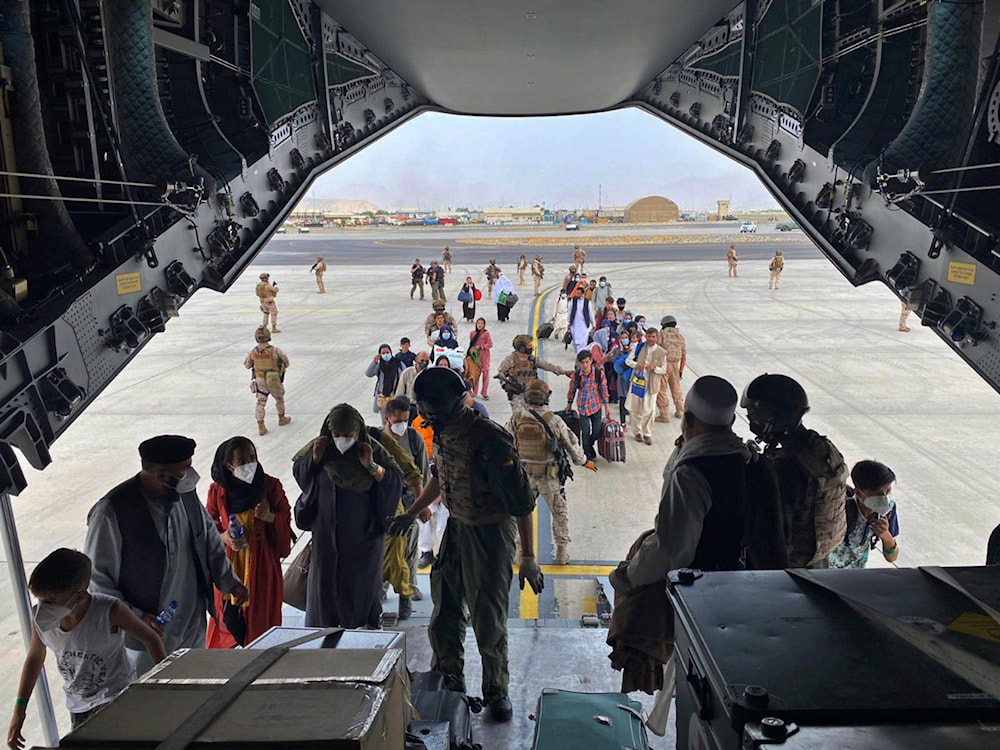Biden administration failures drove fall of Kabul: former US generals
Retired generals Mark Milley and Frank McKenzie, who supervised the evacuation of Afghanistan, say the US' withdrawal was inadequately planned.
-

People board a Spanish Air Force A400 plane as part of an evacuation plan at Kabul airport in Afghanistan, Wednesday, August 18, 2021. (AP)
The top two US generals responsible for overseeing the evacuation of Afghanistan as it fell to the Taliban in August 2021 attributed the chaotic departure to the Biden administration, informing lawmakers on Tuesday that it inadequately prepared for the evacuation and failed to issue timely orders for it.
The rare testimony from the two retired generals publicly revealed, for the first time, the tensions and disagreements the military leaders faced with the Biden administration during the last days of the war. Two crucial differences highlighted included the military's recommendation to maintain at least 2,500 service members in Afghanistan to uphold stability and concerns about the State Department's delayed efforts to initiate an evacuation.
The remarks were in contrast to an internal White House review of the administration's decisions, which concluded that Joe Biden's choices had been "severely constrained" by previous withdrawal agreements negotiated by former US President Donald Trump. The review blamed the military, stating that top commanders had asserted they had adequate resources to manage the evacuation.
Chaotic US withdrawal from Kabul
It's important to mention that thirteen US service members lost their lives to a suicide bomber at the Abbey Gate of Kabul airport in the closing days of the war, during the Taliban's seizure of Afghanistan.
Thousands of panicked Afghans and US citizens made frantic attempts to board US military flights, which were evacuating people out of the country.
The chaos ensued due to the State Department's failure to initiate an evacuation of US personnel until it was too late, as confirmed by both former Joint Chiefs Chairman Gen Mark Milley and retired Gen Kenneth "Frank" McKenzie of US Central Command during their testimony before the House Foreign Affairs Committee.
'The State Department's decision came too late': Milley
Milley said, "On 14 August the non-combatant evacuation operation decision was made by the Department of State and the US military alerted, marshalled, mobilized, and rapidly deployed faster than any military in the world could ever do," adding that the State Department's decision came too late.
“The fundamental mistake, the fundamental flaw was the timing of the state department,” Milley said, adding, “That was too slow and too late.”
'The State Department was not ready': McKenzie
McKenzie stated that evacuation directives must originate from the State Department. However, in the weeks and months leading up to Kabul's fall to the Taliban, the Pentagon urged the State Department to formulate evacuation strategies and expressed concern over the department's lack of readiness.
"We had forces in the region as early as 9 July, but we could do nothing," McKenzie said, calling the state department’s timing "the fatal flaw that created what happened in August."
“I believe the events of mid and late August 2021 were the direct result of delaying the initiation of the [evacuation] for several months, in fact until we were in extremis and the Taliban had overrun the country,” McKenzie said.
Milley was the nation’s top-ranking military officer at the time and had urged the US president to keep a residual force of 2,500 forces there to give Afghanistan’s special forces enough backup to keep the Taliban at bay and allow the US military to hold on to Bagram Air Base.

 4 Min Read
4 Min Read








